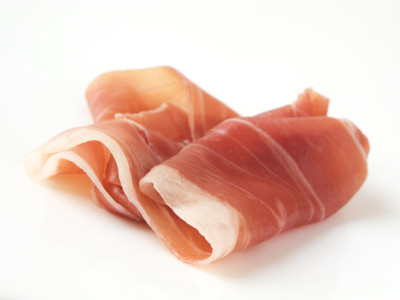A slice of ham from the WCRF
“Don’t give your children ham” says the World Cancer Research Fund today, claiming that 3,700 cases of bowel cancer a year could be prevented in the UK if everyone ate less than 70g of processed meat a week.
The study was widely reported, in the Daily Express, the Guardian, and the Daily Mail, and no doubt elsewhere.
Now 3,700 is an impressive number, so a lot of people may be worried. Should they be?
The lifetime risk of colon cancer is around one in 20 – that is, we have about a one in 20 chance of developing the disease in our lifetimes. It is one of the commoner cancers.
The best studies do suggest that this risk is increased by eating processed meat. The size of the increase varies from study to study, but a large European study (EPIC) put it at about 30 per cent per 100g a day increase in intake, where 100g represents about four rashers of bacon. (Journal of the National Cancer Institute, 97, No 12, p 906-916, June 2005). This finding was statistically significant, but with big confidence intervals: the extra risk could be as low as 7 per cent, or as high as 63 per cent.

Tempting: prosciutto
A more recent US study covering half a million people found that men and women with the highest intakes of processed meat had a 12 per cent greater risk of dying of cancer of any sort in the next ten years than did those with the lowest (Archives of Internal Medicine, 169, no 6, p 562-71, March 2009). The risks of red meat were actually greater than those of processed meat, and, interestingly, the links between both red and processed meat and heart disease were stronger than those with cancer.
This study also found that white meat – chicken, turkey, and fish – had a protective effect, reducing cancer mortality by 11 per cent. The EPIC study also found that fish and poultry were protective, fish much more strongly than poultry.
These studies help to put the risks in perspective. In general, only those who ate the most processed meat were unambiguously at greater risk of colon cancer. For example, in the EPIC study, those eating up to 80 g a day of processed meats did not show a statistically significant increase in colon cancer when compared to those eating less than 10g, and in the US study cancer deaths were not significantly increased for those in the lower 60 per cent of the consumption range.
This puts the WCRF claims into a different perspective. Although they are right to say that if we all ate the minimum quantities of processed meats, cancer cases and cancer deaths would fall, that is a meaningless statistic for most people.
Looked at from the personal perspective, those with most to gain would be those with the highest consumption – in the unlikely event they could be weaned away from a foodstuff they evidently enjoy. Average individuals with average intakes might not – on this evidence – see any gain at all from moving into the below-average category.
What we need are not public health claims – 3,700 fewer cancers! – but what a change of diet might mean to us, personally. The best way to express that is in the form of a number-needed-to-treat. How many people would need to change their diet, and by how much, to avoid a single case of cancer?
The WCRF does not address this, in part because the evidence is too thin, but also because when you express the argument in that way it looks much weaker. The WCRF is a charity devoted to the notion that cancer is preventable, a lifestyle disease. This is, at best, a partial truth.
Suppose we accept the claim that eating 50g of processed meat a day increases the risk of colon cancer by 20 per cent. Knowing the lifetime risk of colon cancer (5 per cent), we can work out that the increased risk would be 6 per cent. The number needed to treat would then be 100. (See David Spiegelhalter’s Understanding Uncertainty website for a fuller explanation.)
In fact, the evidence is that for those in the mid-range of processed meat consumption, the gains made by cutting down would be much smaller. Hundreds of people would need to change their diets to prevent a single case of cancer. So the chances it would benefit you are hundreds to one against.
That's a pretty small gain, compared to losing the joys of eating prosciutto, salami, or the odd bacon sandwich.




Anonymous (not verified) wrote,
Sat, 22/08/2009 - 14:58
I guess this is why my daughter-in-law reacted as though I was trying to poison her children when I offered them frankfurter sausages!
Alan Cleaver (not verified) wrote,
Tue, 01/09/2009 - 13:50
I think another problem with the information being given out is that it's assumed everyone knows what processed meat is/looks like. I don't think the likes of World Cancer Resarch Fund can assume this. A look at the range of packaged meats in any supermarket and even I'm not sure what counts as 'processed' meat and what doesn't. Perhaps time for some clear and obligatory labelling?
Anonymous (not verified) wrote,
Mon, 02/08/2010 - 21:50
Thanks for posting this. I love eating ham for one, and certainly don't consider myself to be eating more than average (in fact less than average) but because of the news about cancer-causing processed meat, I've restricted myself to very very little processed meat (and for my children) and worry about it even so! We will continue to only eat processed meat once or twice weekly, but your post has laid my worries to rest.